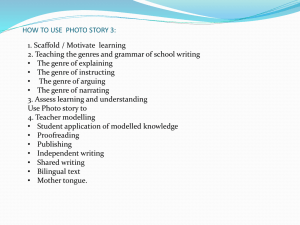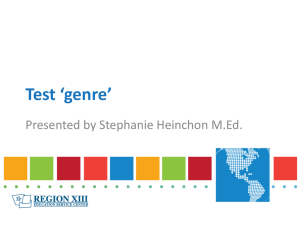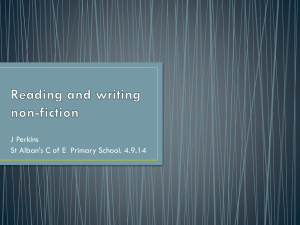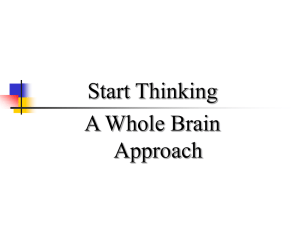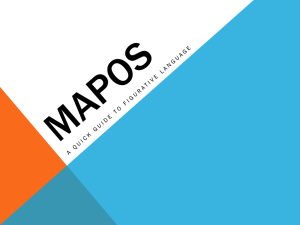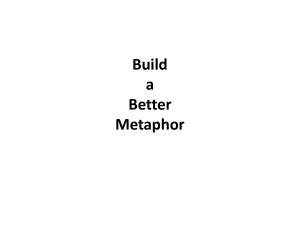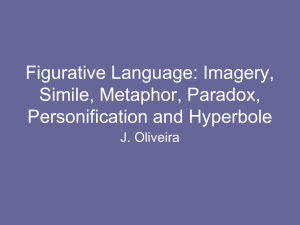NAPLAN writing presentation
advertisement
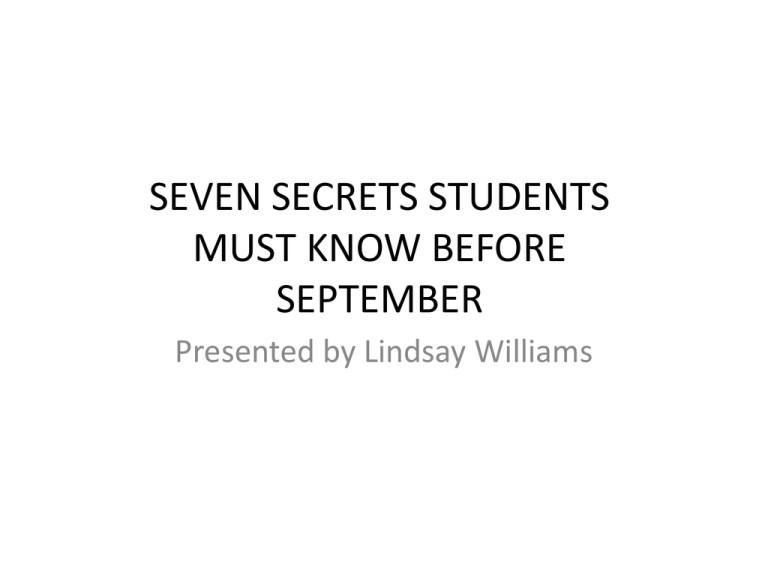
SEVEN SECRETS STUDENTS MUST KNOW BEFORE SEPTEMBER Presented by Lindsay Williams Copyright L & E Williams Holdings Pty Ltd, 2010 AIMS • To consider seven aspects of student writing that can really make a difference in the QCST and NAPLAN Writing Tasks OUTLINE • Aims and outline of session • Seven secrets students must know before September • Theory into action: Improving ‘Self discovery’ • Conclusion THE SEVEN SECRETS What students must know before September THE SEVEN SECRETS 1. Demonstrate a knowledge and understanding of the world beyond your immediate teenage interests and concerns. 2. Add depth to your writing by using a variety of long and short noun groups. 3. Write in third person; avoid first person. 4. Go beyond formulaic, recipe-like approaches to your chosen genre. 5. Use different sentence lengths, types and structures for particular effect. 6. Use vocabulary that helps you take an authoritative stance – strongly positive or negative. 7. Use figurative language and grammatical metaphor. DISCLAIMER These tips do not substitute for: • a good knowledge of the official criteria • or your own reading of student samples published in the Retrospectives and NAPLAN reports each year. Successful writing is an almost mystical blend of ingredients. These secrets are useful tips, but cannot guarantee a high grade. You must use these tips flexibly in order to achieve their desired purpose. There are always exceptions to the rule!! SECRET ONE Demonstrate a knowledge and understanding of the world beyond your immediate teenage interests and concerns. Write about what you know about…but not necessarily your day to day life as a teenager. Remember, you’re trying to show yourself at your very best. Demonstrate your knowledge of the ‘exotic’. Broaden your general knowledge. Read the newspapers and quality magazines (e.g. Time and New Scientist); watch documentaries and the television news; visit galleries and museums; read books and watch television programs about other countries and lifestyles. SECRET TWO Add depth to your writing by using a variety of long and short noun groups. The ship The largest ship I’d ever seen docked in Olympia, a red and black freighter two blocks long and taller than half of downtown. (from Highest Tide by Jim Lynch) Making effective use of the noun group structure, including apposition. Note: Longer noun groups tend to cluster in initial descriptions of short stories. SECRET THREE Write in third person; avoid first person. Under pressure in exams, it is too easy to slip into colloquial, everyday language. Try writing in third person from the perspective of a mature adult. SECRET FOUR Go beyond formulaic, recipe-like approaches to your chosen genre. • Formulaic writing (genre recipes) can assist students achieve passing grades • Data is less conclusive for students achieving higher grades • Students need to be assisted in the ‘subtle task…of creating a form that suits well their ideas and emphases’ Bonnie Albertson (May 2007) VALUE OF GENERIC ‘RECIPES’ QSA Retrospective (2009) ‘The responses sampled this year and in the past raise some concerns about students’ understanding of “genre”. Some responses were composed formulaically around the (supposed) structural components of genre…In contrast…skilled writing focusses on a message…skilled writers make language choices appropriate for the content, purpose and audience…’ (page72) ESSAYS (EXPOSITION) Avoid five paragraph essay with explicit signalling of stages (e.g. firstly, secondly, thirdly…) See ‘Essence’ essay. NARRATIVES (SHORT STORIES) o Slice of life (choose a complication that can be solved in ten minutes ‘real’ time) o in Media Res (in the middle of things…) o avoid explicit signalling of time shifts SECRET FIVE Use different sentence lengths, types and structures for particular effect. As a human race, our conception of history is that it is linear, a long seemingly endless chain of events that stretch behind us like a dust bitten road, never to concern us again. We regard history as dead, a shadowy reality, inhabited only by dead people, in which past events have crumbled away like ash in their insignificance. Yet, this perception is fundamentally flawed. Response 5, 2008 SENTENCE STRUCTURE & LENGTHS He hadn’t ever been destined for the priesthood, to be a man of God, a shepherd guiding his flock of hapless humans. His father wanted him to stay on their farm, remaining forever in the verdant hills with only the cows for company. His mother wanted him to make something of himself, to break the circle of poverty and insignificance his family had so long ago fallen into. Somehow, though, he found himself a priest. Response 2, 2008 SECRET SIX Use vocabulary that helps you take an authoritative stance – strongly positive or negative. Use specific words that carry implicit evaluations and attitudes. Have a store of synonyms and antonyms - graded. Brittany Lindsay is the face of the work against childhood obesity. The young Queenslander was 10 years old and weighed 80kg when she had the signs of a heart attack including chest pain, shortness of breath and pain in her arm. (SM, 11/1/09, page 1) NEWS REPORT Original news report: Brittany Lindsay is the brave face of the battle against childhood obesity. The young Queenslander was just 10 years old and weighed 80kg when she suffered the early signs of a heart attack including acute chest pain, shortness of breath and pain in her arm. (SM, 11/1/09, page 1) ATTITUDINAL VOCABULARY AND ‘PHASES’ (ROSE, 2006) Genre: a culturally-situated, staged, purposeful activity involving action and language Stage: highly predictable segments in each genre Phase: more variable segments within each stage, carrying pulses of information and attitude ATTITUDINAL VOCABULARY AND ‘PHASES’ Orientation ‘setting’ and ‘description’: The flicks of silver fish tails sent flashes of light into my eyes. ‘events’: I swam through the school, chasing them into the long sea grass. ‘comment’ and ‘events’: My laughter sent a stream of bubbles to the surface. I was free, weightless, nothing could hold me back. I kicked my legs and was propelled (??) to the surface for my next breath. Then I could return to my underwater paradise, where I could kick and twist and – APPRAISAL AND ‘PHASES’ Complication ‘problem’: I felt something catch my ankle as my fingertips skimmed out of the water. I kicked again but I couldn’t get my face to the air. I looked down. A fishing line, almost invisible, was wrapped tight around my ankle, cutting into the skin. ‘reaction’: I struggled to free myself but I only tightened it further. My head began to pound in lust for oxygen, but hard as I tried my fingers could do nothing to budge the miniscule knots. My lungs screamed for air, my throat burned, my head was in agony. In a last desperate act I clawed for the surface. Blood flow was cut off to my foot and my head was still half a metre underwater. My insides burning, my skin freezing, my arms and legs exhausted, ‘events’: I relaxed. I took a deep breath and felt a surge of icy salt water rush down my throat. ATTITUDINAL VOCABULARY AND PHASES Orientation: ‘description’ • My laughter • Free • Propelled • Paradise Complication: ‘reaction’ • Struggled • Pound • Screamed • Burned (in lust for oxygen) • Agony • Desperate • Clawed • Burning • Freezing • Exhausted SECRET SEVEN Use figurative language (including lexical metaphor) and grammatical metaphor. Figurative language • Similes (e.g. like the dust of crushed diamonds) • Metaphors (e.g. eyes: black pits from which no light escaped) • Symbols (e.g. jigsaw for the gaps in our knowledge about others) • Alliteration (e.g. honeysuckle scent) Judicious and sparing is enough. GRAMMATICAL METAPHOR Lexical metaphor: meaning is carried by a different, less usual form of wording – one thing means another, e.g. He was menacing. His eyes were dark pits. In simple terms, the meaning from a more congruent word class is carried by another word class. The rope is long [adjective]. The length [noun] of rope Examples Many people have criticised these ideas. These ideas have been subject to widespread criticism. Basically, we assume that (learners) retain unfamiliar words depending on how much they are involved in processing these words. Our basic assumption is that the retention of unfamiliar words is conditional upon the degree of involvement in processing these words. ESSENCE (2008) Examples of nominalization • Our own choosing • So protective • The belief • Aesthetic reasons • Mispronunciation • The obvious remedy • All my travels • The blame • • • • • • • • • • Aramaic origins The connotations My conversations A liar My possession of it Universally protective Our choosing An answer The reasons Their mishandling NAPLAN 08: METAPHOR In the distance, the great city looms. A behemoth of towering structures surrounded by a halo of pollution. An ugly blemish, blocking out the sun as it sinks beneath the horizon. ‘You know, Matt,’ said Thim, sinking his hands in the pockets of his tattered jacket, ‘there used to be these things before the city came. These things called birds. They flew.’ I frowned at this odd statement. NAPLAN 08: NOMINALIZATION In the distance, the great city looms. A behemoth of towering structures surrounded by a halo of pollution. An ugly blemish, blocking out the sun as it sinks beneath the horizon. ‘You know, Matt,’ said Thim, sinking his hands in the pockets of his tattered jacket, ‘there used to be these things before the city came. These things called birds. They flew.’ I frowned at this odd statement. NAPLAN 08: NOMINALIZATION • Dust and smoke particles polluting the air encircled the city a halo of pollution • ‘You know, Matt,’ said Thim, sinking his hands in the pockets of his tattered jacket, ‘there used to be these things before the city came. These things called birds. They flew.’ this odd statement THEORY INTO ACTION MORE SELF-DISCOVERY (P2-3) Suggestions for Melissa • Write in third person • Add depth by packing information into noun groups • Write a narrative (not a personal recount in letter form): relate one incident in detail; start ‘in media res’ • Longer paragraphs; vary sentence themes (currently too many sentences begin with ‘I’) • More infused or implicit evaluation – and vary it more to suit the story phases • Use a central metaphor, e.g. jigsaw (‘I had this hole which I needed to close up…I have been put back together.’) CONCLUSION Questions? REFERENCES Albertson, Bonnie (May 2007). ‘Organisation and development features of Grade 8 and Grade 10 writers: a descriptive study of DelawareTesting Program (DSTP) essays’. Research in the teaching of English. Volume 41:4. Lynch, J. (2008). The highest tide. Great Britain: Bloomsbury. QSA (2009). Queensland Core Skills Test Retrospective 2008. Spring Hill, Queensland: The State of Queensland (QSA). Rose, D. (2006). ‘Reading genre: a new wave of analysis’. Linguistics and the Human Sciences. 2:1.

